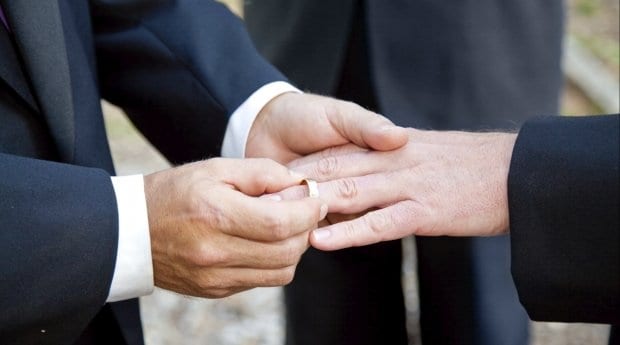The Ontario Court of Appeal has upheld a lower court ruling that two Canadian men who entered into a civil union in the United Kingdom are married under Canadian law, despite a court attempt by one of the men to claim they were not.
Wayne Hincks and the government of Ontario made the case that, under Canadian law, an English same-sex civil union carries all the same tenets of a Canadian marriage. They therefore argued that it would be discriminatory to rule that the two men, who are Canadian citizens, are unable to access Canadian divorce law because they were joined in a place with discriminatory marriage legislation.
Hincks was trying to divide the couple’s shared property and establish spousal support. Gerald Gallardo initially entered into divorce proceedings only to withdraw and insist that the two were never married. They were civil partners, he argued, meaning that the Divorce Act doesn’t apply.
Gallardo was backed by then-federal justice minister Rob Nicholson.
In her Jan 7, 2013, ruling, Ontario Superior Court judge Ruth Mesbur found that “Canadian law specifically holds that only equal access to marriage for civil purposes would respect same-sex couples’ right to equality without discrimination.”
On June 26, the court of appeal agreed unanimously with Mesbur.
“Her interpretation of the terms ‘spouses’ and ‘marriage’ is entirely consistent with one of the fundamental purposes of the (Divorce Act) and the (Family Law Act) — that is, to provide an equitable and certain process for resolving economic issues on the dissolution of a conjugal relationship,” Justice William Hourigan wrote for the court. “To the extent that any ambiguity exists in the relevant legislation, the motion judge’s interpretation is consistent with Charter values and should be preferred.”
Hourigan disputed Gallardo’s claim that Mesbur’s decision had the effect of forcing him into a non-consensual marriage. That argument failed to recognize the “fundamental difference between couples who choose not to marry and instead cohabit, and the parties in this case, who chose not to cohabit and instead entered into a status that was the equivalent to marriage for same-sex couples,” Hourigan ruled. “There is, in these circumstances, no element of coercion or impairment of personal autonomy.”
“The notion of requiring same-sex couples to enforce their rights through this cumbersome and ill-suited process is in effect the same as sanctioning a ‘separate but equal’ regime for same-sex couples. Such a parallel regime has been expressly rejected by this court in Halpern and is inconsistent with Charter values,” Hourigan added.

 Why you can trust Xtra
Why you can trust Xtra


